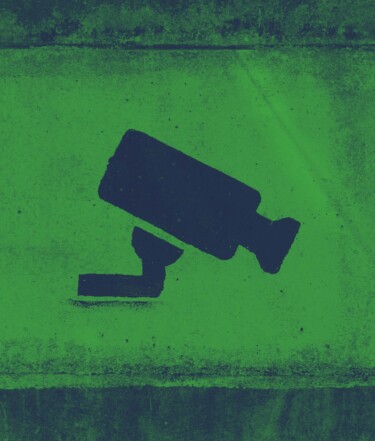
Police search confiscated cell phones – without legal basis
We want to stop the practice whereby the police have virtually unlimited access to private smartphones and the data stored on them after confiscating a phone. Such a serious intrusion into privacy and the right to data protection requires a clear legal basis - and strict limits. That is why we are filing a constitutional complaint.
In early September 2023, young journalist Hendrik Torner accompanied a demonstration by the "Last Generation" in Bamberg with the intention of subsequently writing an article about it in a trade union newspaper. Torner regularly follows civil society demonstrations from a journalistic perspective and is politically active. After the demonstration ended, he witnessed police action against three participants. He documented the police officers' public statements with a voice memo and sent it to himself via Signal chat.
The officers subsequently accused Torner of a criminal offense for violating the confidentiality of spoken words under Section 201 of the Criminal Code. They confiscated his cell phone and had the highly sensitive data – including private photos and chat messages – accessed and analyzed using software from Cellebrite.
The police subsequently compiled a comprehensive report on the plaintiff's political activities and his affiliation with various left-wing political groups. There was no discernible connection to the specific criminal charge. The analysis was therefore clearly no longer relevant to the investigation. Torner only got his cell phone back after the public prosecutor's office dropped the case in August 2024.
The confiscation of the cell phone was confirmed by the Bamberg District Court. Torner filed an appeal against this decision at the Bamberg Regional Court in April 2025. The grounds for the appeal were drafted by the GFF together with Torner's lawyer, Gül Pinar.
At the end of June 2025, the regional court ruled that the confiscation of the cell phone had only been lawful for the first three months. The measures taken in the remaining eight months, until the public prosecutor's office dropped the case, were unlawful due to the lack of a criminal complaint – these included, for example, the police storing numerous private photos and evaluating the content of the data.
ENORMOUS POTENTIAL FOR ABUSE FOR INDIVIDUALS AND SOCIETY
This practise is not unusual: Mobile phones are confiscated and analyzed every day for the purpose of law enforcement. This is possible for every conceivable crime; simple initial suspicion is sufficient. While confiscation must generally be ordered by a court, the police themselves usually decide which data is subsequently accessed and analyzed. Once a cell phone is unlocked, all data stored on it is generally accessible to the authorities, especially highly personal and confidential information.
The police can gain deep insights into the personality and core aspects of the private lives of those affected, without reference to the actual reason for the seizure, and use this information for other purposes. Fundamental trust in the protection of digital communications is undermined – whether in private, professional, or legally protected settings. This constitutes a serious infringement of the so-called fundamental IT right, which protects the confidentiality and integrity of information technology systems.
The fact that the police stored my photos and created a profile of my political activities was a massive invasion of my privacy and was in no way justified. Where is freedom of the press if, as a journalist, I cannot rely on confidential information remaining confidential?
Young journalist and claimant
Extensive government access to sensitive data can deter people from civic and political engagement, as well as from journalistic research. If, for example, journalists fear that government security agencies can intercept all confidential communications based on even the slightest initial suspicion, journalistic work becomes significantly more difficult – especially when it comes to critical research into the exercise of government power. This endangers press freedom – a cornerstone of democracy.
GOVERNMENT SMARTPHONE ANALYSIS REQUIRES STRICT LEGAL LIMITS
In a society based on the rule of law, the admissibility and scope of such a serious infringement of fundamental rights must be determined by the democratically legitimized legislature itself and limited to appropriate cases. Furthermore, legal safeguards are needed to prevent the collection or analysis of information from the inviolable core area of private life.
However, there is currently no specific legal basis that meets these constitutional requirements. Moreover, there is a lack of prior judicial review that specifies the type, scope, and limits of data analysis in individual cases. Leaving the decision on the admissibility and extent of data analysis solely to the police and public prosecutor's office is incompatible with the rule of law and democratic principles.
WE WANT A LANDMARK JUDGMENT AGAINST UNRESTRICTED DATA ANALYSIS
With the constitutional complaint filed jointly with Hendrik Torner and his lawyer Gül Pinar (TWP Strafrechtskanzlei), we want to establish that investigative authorities are acting unconstitutionally when they access the entire data set of a confiscated cell phone, since there is currently no sufficient legal basis for that.
To date, investigating authorities have relied on the seizure provisions of Sections 94 et seq. of the Code of Criminal Procedure when evaluating data from seized cell phones. However, the wording of these provisions does not regulate the manner in which data access is permissible or the extent to which it is appropriate. This means that there is no legal basis specifying the framework for data access. The judicial reservation provided for in the case of seizure is also insufficient because it usually does not contain any information on how the police should subsequently handle the data collected.
DOCUMENTATION OF POLICE ACTIONS MUST BE PERMITTED
With our constitutional complaint, we also want to establish that it does not violate the confidentiality of the spoken word, and is therefore not punishable, if police measures that take place in public are documented. There is no supreme court ruling on this yet, and the decisions of the lower courts are not uniform.
DATA PROTECTION IS PROTECTION OF FUNDAMENTAL RIGHTS
We are also challenging the government's disproportionate analysis of private smartphones with two other cases. In February 2023, following our lawsuit, the Federal Administrative Court declared the practice of analyzing cell phone data by the Federal Office for Migration and Refugees unlawful. We are also challenging the legal basis and official practice of accessing and analyzing cell phones and thus highly personal data of asylum seekers – based on an unconstitutional provision in the Residence Act.
Intimate personal information on cell phones must be confidential – for everyone. The government may only access this data in exceptional cases and under strict rules – whether this concerns people with a refugee background, politically active individuals, or journalists.




